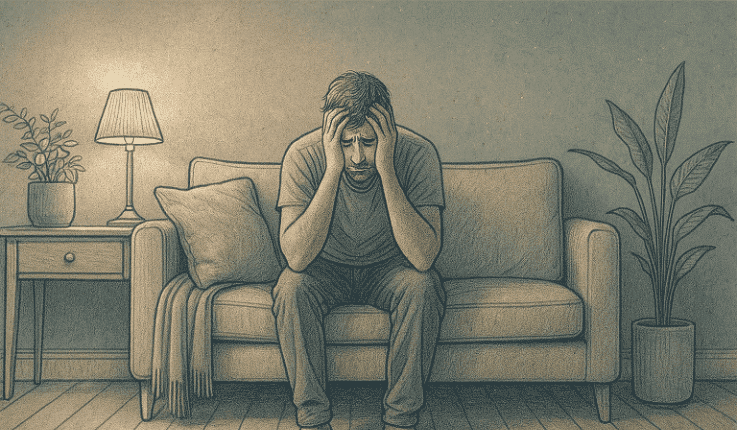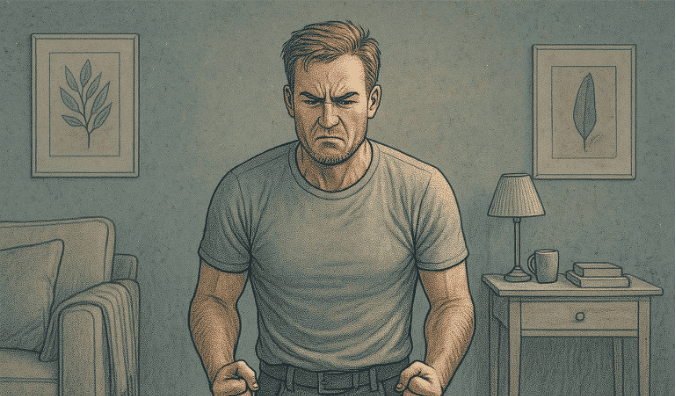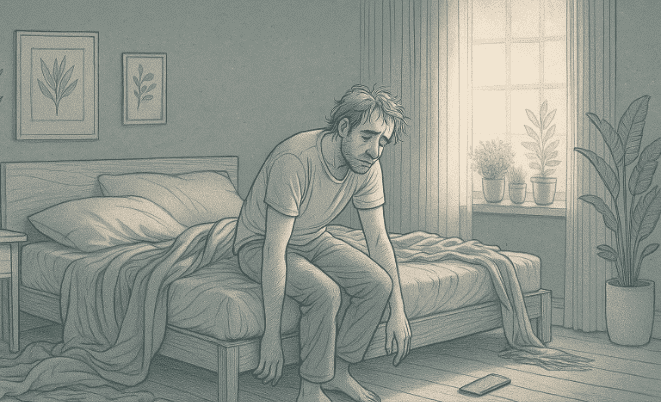
Key Takeaways
- A mental breakdown describes a period when overwhelming stress makes it difficult or impossible to function in daily life, though it’s not an official medical diagnosis.
- Men often experience mental health crises differently than women, with symptoms appearing as anger, irritability, and withdrawal rather than visible sadness or emotional expression.
- Warning signs include increased anger and emotional outbursts, pulling away from relationships, extreme fatigue, concentration problems, and unexplained physical symptoms like headaches or digestive issues.
- Cultural expectations that discourage men from expressing vulnerability or seeking help often delay recognition and treatment of mental health crises.
- Mission Connection Healthcare recognizes that men’s mental health crises often manifest as anger and withdrawal rather than visible sadness, offering judgment-free, action-focused therapy through CBT, DBT, and men’s groups, meeting you where you are without expecting you to fit a mold.
Understanding Mental Breakdowns in Men: Breaking the Silence
A mental breakdown happens when stress reaches a point where daily life feels impossible to manage. It’s not a formal diagnosis, but it’s a real and serious experience where your coping ability is overwhelmed.
For men, spotting the signs can be tough. Many grow up believing they should stay strong, hide emotions, and handle problems alone. Irritability, withdrawal, or overworking might seem like ways to cope, but they often signal a deeper mental health struggle.
Men often show distress differently: snapping at others, taking risks, or feeling constantly tense instead of appearing sad. These are signs your mind and body need care, not proof of weakness.
A mental breakdown is a genuine crisis that deserves attention and professional help. Reaching out doesn’t make you weak; it’s a powerful first step toward recovery.
Mission Connection offers flexible outpatient care for adults needing more than weekly therapy. Our in-person and telehealth programs include individual, group, and experiential therapy, along with psychiatric care and medication management.
We treat anxiety, depression, trauma, and bipolar disorder using evidence-based approaches like CBT, DBT, mindfulness, and trauma-focused therapies. Designed to fit into daily life, our services provide consistent support without requiring residential care.
5 Signs of a Mental Breakdown in Men
Sign 1: Increased Anger, Irritability, and Emotional Outbursts
One of the most common signs of a mental breakdown in men is a noticeable increase in anger and irritability. You might find yourself snapping at your partner or children over minor issues, experiencing road rage, or feeling constantly frustrated by things that wouldn’t normally bother you. Small annoyances trigger significant emotional reactions that feel out of your control.
This anger often masks deeper feelings of sadness, fear, or helplessness. When cultural norms discourage men from expressing vulnerability, anger becomes the default emotional outlet. You might recognize that your reactions are disproportionate to the situation, but feel unable to stop these outbursts from happening.
Beyond anger, you may experience dramatic mood swings, shifting quickly from irritability to numbness or emotional flatness. These emotional changes can strain your relationships with family, friends, and coworkers, creating additional stress that worsens the breakdown. Recognizing that these anger issues may signal an underlying mental health crisis rather than just a bad temper is an important first step.

Sign 2: Withdrawal from Relationships and Activities
When experiencing a mental breakdown, you may increasingly pull away from the people and activities that once brought you joy or meaning. You might cancel plans with friends repeatedly, avoid family gatherings, or stop participating in hobbies you previously enjoyed. Going to work becomes difficult, and you might start missing days or calling in sick.
This withdrawal happens for several reasons. You may feel emotionally exhausted and unable to maintain the energy required for social interaction. The effort of appearing okay around others feels impossible when you’re barely holding yourself together. Some men withdraw because they feel ashamed of their struggle and don’t want others to see them in a vulnerable state.
Unlike the more visible withdrawal patterns sometimes seen in women, men often mask their isolation by appearing busy with work or other commitments. You might throw yourself into your job, spending long hours at the office not because you’re productive, but because being alone feels safer than facing relationships or emotions. This pattern of withdrawal and avoidance prevents the connection and support that could help you recover.
Sign 3: Extreme Fatigue and Sleep Disruptions
Mental breakdowns often bring profound exhaustion that doesn’t improve with rest. You might sleep ten or more hours yet still wake feeling drained, or find yourself unable to get out of bed in the morning. Even simple tasks like showering or making breakfast feel overwhelming and require tremendous effort.
Conversely, some men experience severe insomnia during a breakdown. Your mind races with worries, making it impossible to fall asleep or stay asleep through the night. You might lie awake replaying stressful situations or feeling anxious about the future. This sleep disruption creates a vicious cycle where exhaustion worsens your ability to cope with stress, which then makes sleep even more difficult.
The fatigue extends beyond physical tiredness to mental and emotional exhaustion. Concentrating on work projects becomes nearly impossible. Conversations feel draining. Everything requires more energy than you have available, leaving you feeling defeated and unable to meet your responsibilities.

Sign 4: Difficulty Concentrating and Memory Problems
A mental breakdown significantly impairs your cognitive functioning. You might struggle to focus on tasks that would normally be straightforward, finding your mind wandering constantly or unable to follow conversations. Work projects that once felt manageable now seem impossibly complex, and you make mistakes you wouldn’t typically make.
Memory problems often accompany these concentration difficulties. You forget appointments, miss deadlines, or can’t remember conversations from earlier in the day. This isn’t laziness or lack of trying; chronic stress actually affects brain structure and function, impairing your ability to process information and form memories.
Racing thoughts are another common cognitive symptom during a breakdown. Your mind jumps rapidly between worries, replaying past mistakes, or catastrophizing about potential future problems. These intrusive thoughts make it nearly impossible to stay present or complete tasks requiring sustained attention. The frustration of knowing you’re not functioning at your usual level adds another layer of stress to an already overwhelming situation.
Sign 5: Physical Symptoms Without Clear Medical Cause
Mental health crises manifest physically in ways that may initially seem unrelated to stress or emotions. You might experience persistent headaches, muscle tension, particularly in your neck and shoulders, or chronic back pain. Digestive problems like stomach aches, nausea, constipation, or diarrhea become frequent issues.
Some men experience chest tightness or heart palpitations during a breakdown, which can be frightening and may lead to emergency room visits. While these symptoms warrant medical evaluation to rule out physical causes, they’re often manifestations of severe anxiety and stress rather than underlying physical disease.
Other physical signs include changes in appetite, either eating significantly more or losing interest in food entirely, leading to noticeable weight changes. You might develop frequent colds or infections as chronic stress weakens your immune system. Some men notice they’re neglecting personal hygiene, skipping showers, or wearing the same clothes for days, reflecting how overwhelmed they feel by even basic self-care tasks.
Mission Connection Healthcare: Creating Safe Spaces for Men’s Mental Health

Reaching out for help when you’re experiencing a mental breakdown takes courage, especially when everything you’ve learned tells you to handle problems alone. At Mission Connection Healthcare, we understand the specific barriers men face in seeking mental health support, and we’ve created an environment where you can address these challenges without judgment.
Our therapists recognize that men’s mental health crises often look different from the textbook descriptions of depression or anxiety. We understand that anger, withdrawal, and emotional numbness are legitimate expressions of distress, not signs that you’re not trying hard enough or doing it wrong. We meet you where you are, working collaboratively to address what’s actually happening in your life rather than expecting you to fit a certain mold.
Individual therapy provides a confidential space to explore the stress, pressure, and expectations that led to your breakdown. Using approaches like Cognitive Behavioral Therapy and Dialectical Behavior Therapy, we help you develop practical skills for managing overwhelming emotions, challenging unhelpful beliefs about what it means to be a man, and rebuilding your capacity to cope with life’s challenges.
Group therapy programs connect you with other men working through similar struggles. These groups provide the perspective that you’re not alone in facing mental health challenges, despite what cultural messages might suggest. Many men find relief in discovering that other successful, capable men also experience breakdowns and need support, challenging the belief that seeking help equals weakness.
With both in-person and telehealth options available across California, Virginia, and Washington state, we make treatment accessible when you’re ready to take that step. We understand that admitting you need help may feel like one of the hardest things you’ve done. Our therapists respond to that courage with the respect it deserves, providing expert guidance as you work toward recovery and build a more sustainable, authentic way of living.
Call Today 866-833-1822.
Frequently Asked Questions (FAQ)
How do I know if what I’m experiencing is a mental breakdown or just stress?
Everyone experiences stress, but a mental breakdown involves stress so severe that it interferes with your ability to function in daily life. If you’re missing work, withdrawing from relationships, experiencing constant anger or irritability, or finding that normal tasks feel impossible, these signal something beyond typical stress. The key difference is impairment in functioning and the inability to cope using your usual strategies.
Will seeking therapy make me look weak to others?
Seeking therapy is actually a sign of strength and self-awareness, not weakness. Taking action to address a problem rather than letting it worsen demonstrates courage and responsibility. Many successful men, including athletes, business leaders, and military personnel, use therapy to maintain their mental health. What’s truly costly is allowing a breakdown to continue untreated, damaging your health, relationships, and career.
Can lifestyle changes alone resolve a mental breakdown?
While lifestyle changes like exercise, better sleep, and stress management are beneficial and important parts of recovery, mental breakdowns typically require professional treatment to fully resolve. Therapy helps you address the underlying thought patterns, emotional difficulties, and coping strategies that contributed to the crisis. Combining therapy with lifestyle changes provides the most comprehensive and effective path to recovery.
Does Mission Connection Healthcare specialize in men’s mental health?
Yes. Mission Connection Healthcare understands the unique challenges men face in recognizing and addressing mental health concerns. Our therapists are experienced in working with men experiencing mental breakdowns, depression, anxiety, and stress-related conditions. We provide evidence-based treatments, including CBT and DBT, through individual and group therapy, with both in-person and telehealth options available. Our approach respects the specific barriers men encounter while providing the support necessary for genuine healing and recovery.








